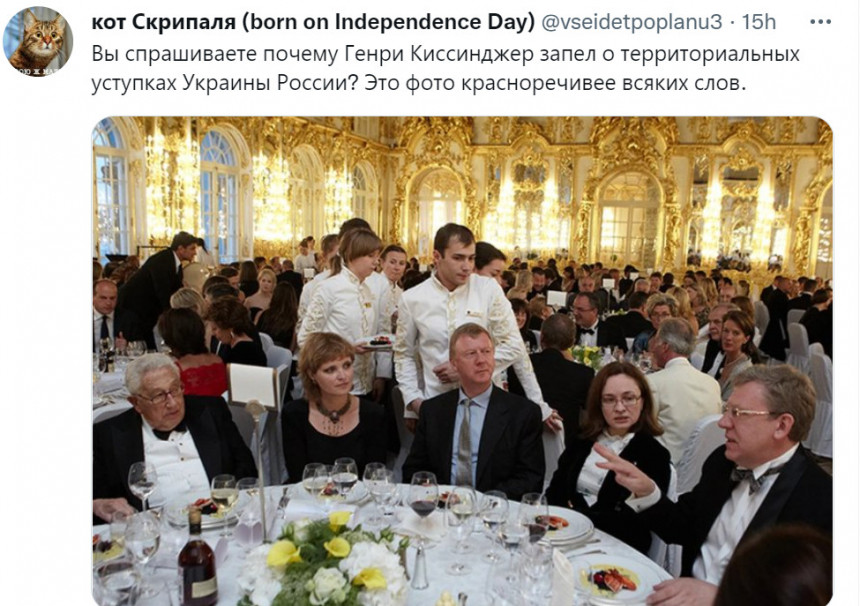The legendary Henry Kissinger's unfortunate birthday present to himself

Henry Kissinger, once a superstar of diplomacy, at the age of 98 (he turns 99 today), spoke at the Davos Economic Forum with his proposal for a solution to the Ukraine war.
Kissinger's "proposal" must definitely be put in quotation marks, because it contains nothing of substance. We should stop the hostilities, start negotiations and then we will see... The West must not forget Russia's role in Europe and must therefore not be "swayed by short-term emotions". Ukraine must be forced to come to the discussion table and negotiate. Negotiate with who? With the aggressor.
This speech by Kissinger drew various epithets. I thought it was disgraceful. It destroyed his former dignity and admiration. No one will say it more aptly than the President of Ukraine, Volodymyr Zelensky: "But still in Davos, for example, Mr. Kissinger emerges from the deep past and says that a piece of Ukraine should be given to Russia. So that there is no alienation of Russia from Europe. It seems that Mr. Kissinger's calendar is not 2022, but 1938, and he thought he was talking to an audience not in Davos, but in Munich of that time."
In order to leave no ambiguity, to make the attitude absolutely clear, Zelensky reminded Kissinger, as one Jewish man to another, that Kissinger, born in Germany, himself fled Nazi Germany in 1938 at the age of 15. "He understood everything perfectly. And nobody heard from him then that it was necessary to adapt to the Nazis instead of fleeing them or fighting them."
This performance by Kissinger might not even be worth mentioning if it had not been voiced by such a legendary personality. His 1971 secret flight to Beijing will forever go down in diplomatic history. It took place during his official visit to Pakistan. Let me remind you that at that time China had no diplomatic relations with the US at all, and the US recognized the Republic of China (Taiwan) as the "real" China. Kissinger feigned digestive distress in Pakistan, left his hotel in Karachi quietly and just as secretly (it is even said that he was hiding in a box) flew to China, where he negotiated with the head of the Communist Chinese government, the second man in the country, Zhou Enlai, an agreement on mutual recognition and further cooperation between China and the USA. Now, more than half a century later, it is no longer clear who has benefited more from this cooperation - China or the US. It may have been the Chinese who, at the time, wrapped the "genius" of diplomatic finesse - Kissinger - around their fingers.
Be that as it may, Kissinger is undoubtedly a legendary figure. One could even say that he embodies an entire era. From an early age, I remember these foreign politicians with the sonorous names of British kings - Richard Nixon and Henry Kissinger. The President of the United States and his National Security Adviser, later Secretary of State. It was under Kissinger that the geostrategic reformatting of the world took place, during which Communist China became almost an ally of the United States in the fight against the Communist bloc led by the USSR, which prevented the two Communist powers from uniting against the so-called free world.
But all that is history now, and Kissinger has had his reputation for "excellence" thoroughly tarnished over time. He has long since earned the reputation of being a Putin-appreciator, but now in Davos he has managed to squander the last vestiges of his authority. In this respect, he is reminiscent of the great Norwegian writer, Knut Hamsun, who in his latter years squandered all the fame and respect he had gained in his long life by expressing his support for Hitler. Although this support was purely symbolic, even indirect, it forever damaged the world's attitude towards him.
Observers who know Kissinger better point to his undisguised love of money, luxury and ambition. Given that similar ideas were floated elsewhere at the same time as Kissinger's remarks, there is reason to suspect that the Kremlin, through its network of agents built up over many years and fed regularly, is conducting a massive propaganda offensive aimed at exerting pressure not only on the Ukrainian President, the Ukrainian political class and the Ukrainian people, but to create a certain background for the proposals of all these Scholzs, Macrons and other realpolitik politicians, which may not be so unacceptable in form but are not much different in substance from Kissinger's "plan".
I should certainly mention here the New York Times editorial of May 19, which is permeated by the same idea. Russia cannot lose the war. Ukraine, on the other hand, cannot win it, so the issue must be settled by concessions. Ukraine, of course, must make concessions, because there is no reason to chase after an "illusory victory". Peace in exchange for territory. Even if it is sneakily left unsaid, the idea - first the ceasefire negotiations, and then the borders - is a disguised form of the same formula.
The fact that this formula - peace in exchange for territory - effectively destroys the entire world order of the last 70 years, as enshrined in the 1975 Helsinki Final Act, is somehow forgotten. The question of what the world order will be like when it turns out that countries can forcibly conquer and annex the territory of another country and go on living with no consequences is not answered. The fact that such precedents could be contagious and push the world further towards a new world redistribution (world war) is not mentioned at all.
To remind all these realpolitik enthusiasts where such realpolitik ends, Zelensky said the same words in the direction of The New York Times as he did to Kissinger: "Perhaps The New York Times in 1938 also wrote something similar. But now, let me remind you, it is 2022."
